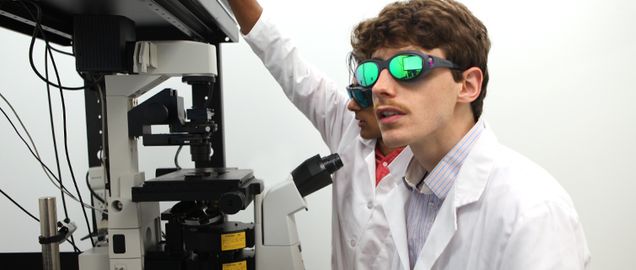PhD Programs

The PhD programs in Graduate Medical Sciences allow students to study alongside our world-class faculty in the Boston University Medical Campus, our modern urban academic health center. Each of our programs offers diverse curriculum options, strong professional development training and a fully funded financial aid package, including tuition, a competitive stipend, and health insurance.
Umbrella Program
Biomedical Sciences
Boston University’s Program in Biomedical Sciences (PiBS) provides rigorous training towards a PhD degree by integrating the foundations of interdisciplinary biomedical research with focused investigation and preparation for career advancement. PiBS offers first-year students the opportunity to explore a variety of research areas over the course of three laboratory rotations along with a core curriculum to help determine the direction of their PhD focus. Degree granting departments and programs are listed below. In addition, students can participate in the Immunology Training Program, ultimately earning their degrees within either the Microbiology or Pathology departments.
- Biochemistry & Cell Biology
- Biophysics
- Genetics & Genomics
- Microbiology (including the Immunology Training Program)
- Molecular & Translational Medicine
- Nutrition & Metabolism
- Orofacial and Skeletal Biology
- Pathology (including the Immunology Training Program)
- Physiology
Neuroscience: Boston University-Campus Wide Degree Program
Neuroscience
The Graduate Program for Neuroscience (GPN) is a University-wide PhD degree-granting program in neuroscience that unites the graduate training faculty on the Medical Campus (BUMC) and the Charles River Campus (CRC). The GPN curriculum provides a broad cross-disciplinary core education including molecular, cellular, and systems, cognitive and behavioral, computational and clinical and the flexibility to take neuroscience-related coursework in any of the departments and programs of the University to build depth of specialization. *Computational Neuroscience track available
Direct Entry Programs
This 64-credit doctoral program includes courses in Anatomy and Neuroscience offered by the Department of Anatomy and Neurobiology, related departments on the Medical Campus and the Chobanian & Avedisian School of Medicine. An integral part of the program is the requirement for students to participate as Teaching Fellows in Medical and Graduate school courses as part of our Vesalius Teaching Apprenticeship. The PhD program is designed to produce well-rounded biomedical scientists who expect to include both research and teaching in their career.
Behavioral Neuroscience
An interdisciplinary program administered through Graduate Medical Sciences, the Behavioral Neuroscience PhD Program provides students with a firm foundation in basic principles and methods of Experimental Neuropsychology in
Pharmacology prepares students for a career as an experimental neuropsychologist and behavioral neuroscientist in academia or industry. Our unique program focuses on human neurobehavioral disorders in relation to brain structure and functioning, providing a true translational link between cutting-edge research and emphasis on medical patient care.
The PhD Program in Pharmacology at Boston University Chobanian & Avedisian School of Medicine is a unique interdisciplinary and interdepartmental learning environment for doctoral students. The first 18 months emphasize formal course work and a sequence of four required laboratory rotations. Laboratory work provides students with the opportunity to investigate potential areas for dissertation research while enhancing the breadth of their training. Students also experience an industrial rotation at Pfizer to develop their research skills. This program also allows later stage entry for students pursuing a PhD in Neuroscience or a PhD in Biomedical Engineering.
Additional programs of study
- Combined MD /PhD Program
- Vesalius “Certificate” for PhD students in the Department of Anatomy and Neurobiology
Available Training Grants
Students receive funding for training in specific areas including: Addiction Science, Aging, Biomolecular Pharmacology, Cancer Biology, Cardiovascular Biology, Inflammation, Metabolism, Endocrinology and Obesity, Pathogenesis, Pulmonary Biology and Immunology.

